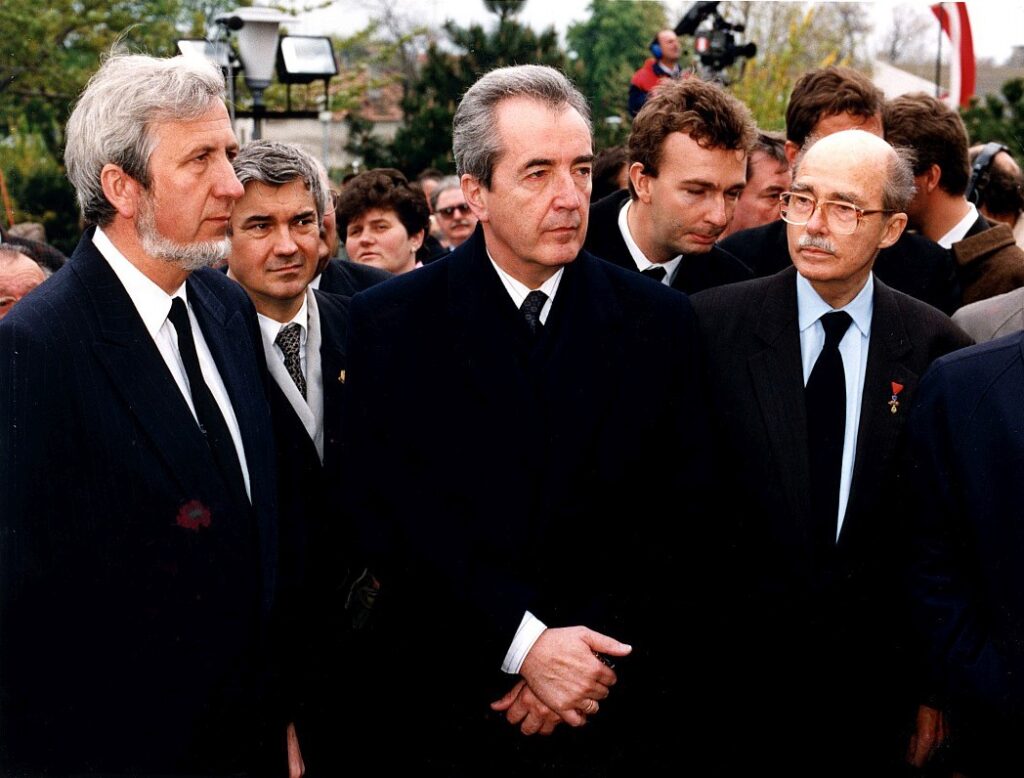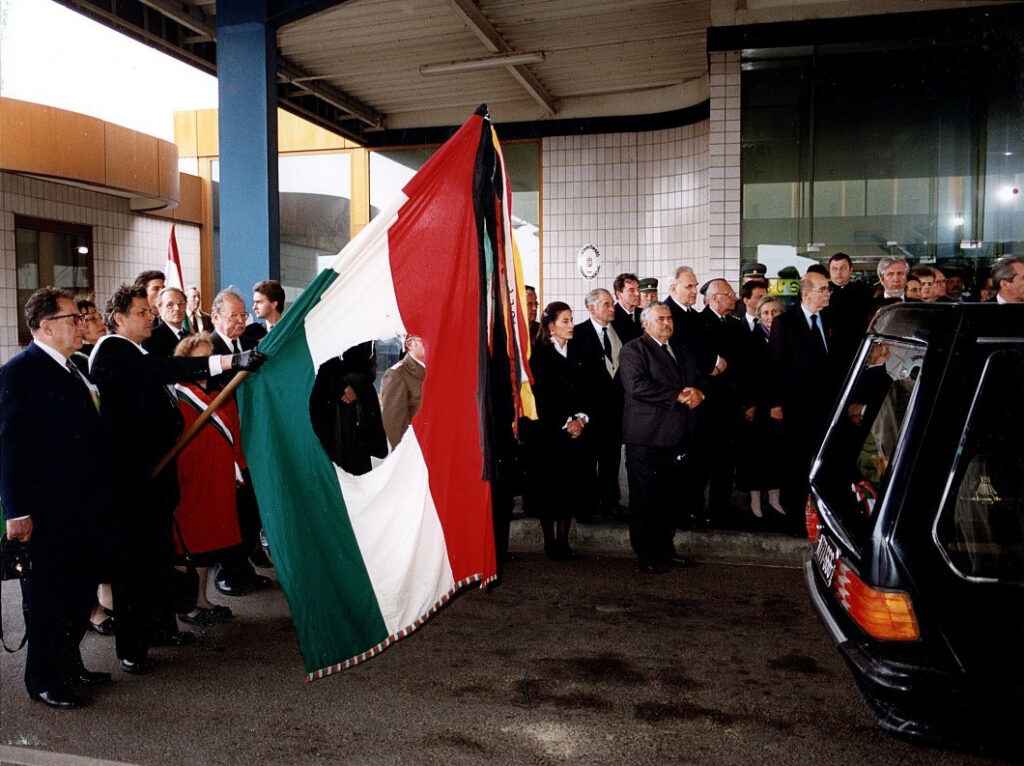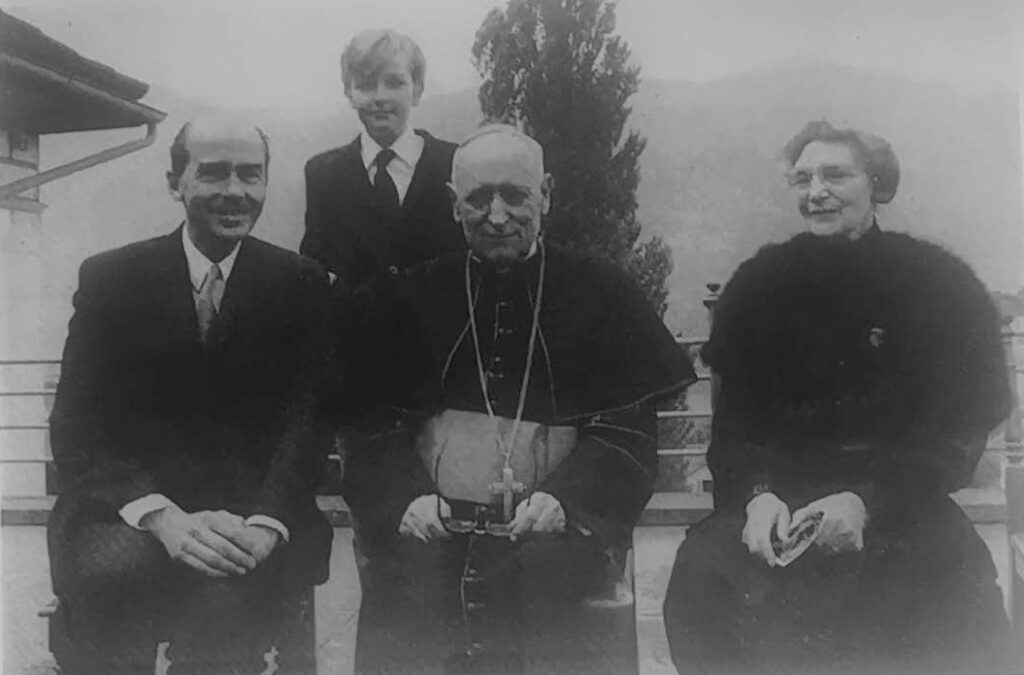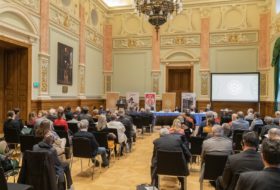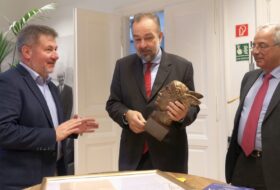30 years ago on May 4, 1991, the late Prince Primate of Esztergom József Mindszenty was reburied in Hungary. Otto von Habsburg attended the event and also gave a speech. The former Crown Prince arrived in Budapest on May 1, and before the reburial he appeared on several programs, among others in Tata and in Győr. Nevertheless, at this occasion Otto von Habsburg had visited Hungary the fourth time in the same year. Ádám Reviczky, who was the office director of the Hungarian Pan-European Association at the time, played a significant role in organizing the trips.
Otto von Habsburg was joined by his three children, Walburga, Charles and Georg at noon in the bordertown of Nickelsdorf on May 3. Cardinal Hans Groer, Archbishop of Vienna, Cardinal László Paskai, Primate, Archbishop of Esztergom, Bishop István László of Eisenstadt, Miklós Pálos, Secretary of State of the Prime Minister’s Office, Sándor Keresztes Ambassador to the Vatican and Denes Hunkar Ambassador to Vienna were also present. The welcoming speeches were given by Hans Sipötz, President of the Burgenland Provincial Government, Géza Jeszenszky, Minister for Foreign Affairs in Hungary and Alois Mock, Austrian Foreign Minister. The automobile taking Otto von Habsburg also joined the convoy that followed Mindszenty’s coffin through Hegyeshalom to Esztergom. The cardinal’s ashes were carried by the same black Mercedes that was used at the funeral of Queen Zita on April 1, 1989.
At the border crossing town of Hegyeshalom, a large number of public figures gathered in honor of the former Prince Primate. Otto von Habsburg listened to the speeches of the Austrian Foreign Minister, the Hungarian Minister of Culture and Public Education Bertalan Andrásfalvy and Sándor Lezsák.
After Cardinal Opilio Rossi Representative of the Holy See, Prime Minister József Antall, Attila Miklósházy Bishop of Hungarians Abroad, and Weren Fried van Straaten, a Dutch monk from Premontre and the founder of the organization Persecuted Churches (AED / ACN), Otto von Habsburg, Member of the European Parliament and President of the International Pan-European Union also gave a speech:
|
“Among the gifts of the Holy Spirit there is one, that is not so common in any age including ours: fortitudo, heroism. It is fair to say that exaggerated diplomacy can take a nation, a society, but even a continent to the edge of an abyss. The average people are uncomfortable with a brave and outspoken person, not only because he is different from them, but also because he awakens the bad conscience of the opportunists. In this way, the hero is an outstanding personality and in the long term necessarily becomes a symbol for his community or nation. Especially where an entire nation feels threatened in a desperate situation, they turn to those whose example they can follow in times of crisis. During our turbulent history, outstanding personalities such as St. Ladislaus, János Hunyadi or Miklós Zrínyi poured trust and courage into their compatriots in the crucial hours, whether they won or testified with their blood. Today, Hungarians and even Christianity are in much greater danger than even in the most dangerous times of the past. Materialist totalitarianism wrought irreparable destruction not only in physical existence but also in souls. Marxism wanted to create a new man, exterminating the national feeling and overthrowing God from his throne. Our Prince Primate József Mindszenty descendant of St. Gellert entered the stage of history in these critical hours. He dared to say no to both Hitler’s and the communist’s tyranny. He defended Christianity, his homeland and his people, performed his ecclesiastical duties without fear, and wore dignity under public law. This skinny, so to speak sickly looking, physically small man became a giant of the Hungarians. He represented his faith and homeland before the world. With his flaming words and exemplary personality, he encouraged everyone from his prison as well as from exile. He was brave when he fought his opponents, but at the same time humbly obeyed his legitimate ecclesiastical superiors. As the decision of his church struck a bloody wound on his soul, he suffered bitterly but did not protest, did not complain, but bore this heaviest cross trusting in God. He thus reached the pinnacle of heroism and martyrdom – his Calvary. Today, when his ashes return to his beloved homeland, we know that Mindszenty and his tormented nation have won: we owe the freedom of Hungary to him, because he kept in us the faith and the hope that God’s righteousness would cast the last word. József Mindszenty brought the resurrection to us on Good Friday.” |
After the ceremony, Otto von Habsburg attended the official lunch in Esztergom in the Prímás Cellar and then travelled to Zamárdi. In the next two days, further meetings were included in his program in Székesfehérvár and Budapest. On the afternoon of May 6, he left Hungary by plane.
In connection with the reburial of József Mindszenty, Otto von Habsburg was approached by Béla Kurcz, a journalist of Magyar Nemzet, on March 4, 1991, and asked him for an article about his personal relations with the cardinal. The former Crown Prince accepted the invitation and sent a long article to the newspaper titled “Prince Primate Returns Home”. The article was published on May 4, 1991, under the title “He Remained Faithful to His Ideas to the Last Minute of His Life”.
MagyarNemzet_1991_05__pages40-40
In connection with the reburial of the late Prince Primate, Otto made a brief statement to Béla Kovács, a journalist of Népszabadság, on May 3, 1991, before the event. Among other things, he spoke about his relationship with József Mindszenty. “We first met in the United States, then later when he got out of Hungary. All I can say about his legacy is that József Mindszenty did an extremely great service for us Hungarians. In a world where compromise and cowardice reigned, he was a symbol of courage. – He added: Mindszenty’s name is known everywhere. As an emigrant living in the “West”, he played a major role in changing the image of our country in a positive way.”
After the first meeting in 1947, they remained in contact, through intermediaries, until the arrest of the Prince Primate, as in 1956, during the days of freedom, and later from September 1971, when the Hungarian cardinal was able to leave the US Embassy in Budapest after nearly fifteen years. On February 5, 1990, Otto von Habsburg, in his testimony before the Supreme Court during the review of the Mindszenty trial, clearly refuted the accusations made against the cardinal in 1949 by the Hungarian Communists.
One of the main allegations in the 1949 show trial against the Prince Primate was that in the summer of 1947 in connection with the celebrations of Mary in Ottawa he conspired against the “democratic republican state order”. Otto had great respect for the legitimate cardinal twenty years older than him, but he also knew his limitations. He repeatedly emphasized that Mindszenty had not been given the opportunity to view the situation in Hungary from outside in a larger world political context.
For the former Crown Prince who was involved in the reburial thirty years ago, József Mindszenty was “above all a man of God. […] – who – fought steadfastly even when the enemy force struck him. He knew that faith always overcomes worldly violence because eternity belongs to God.” He also stated that “József Mindszenty was not only a faithful follower of Jesus, but also a great Hungarian patriot.”
Gergely Fejérdy

